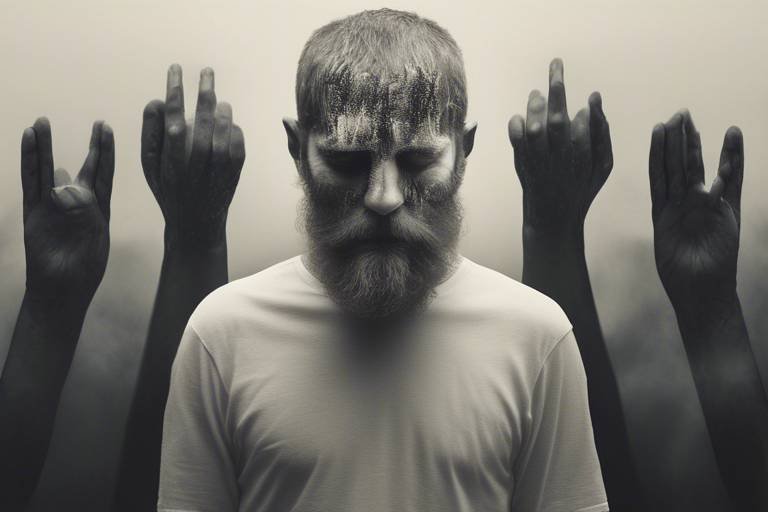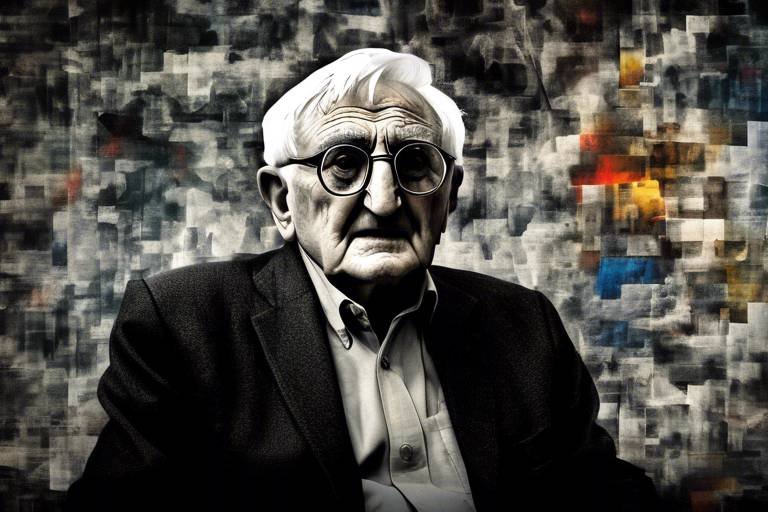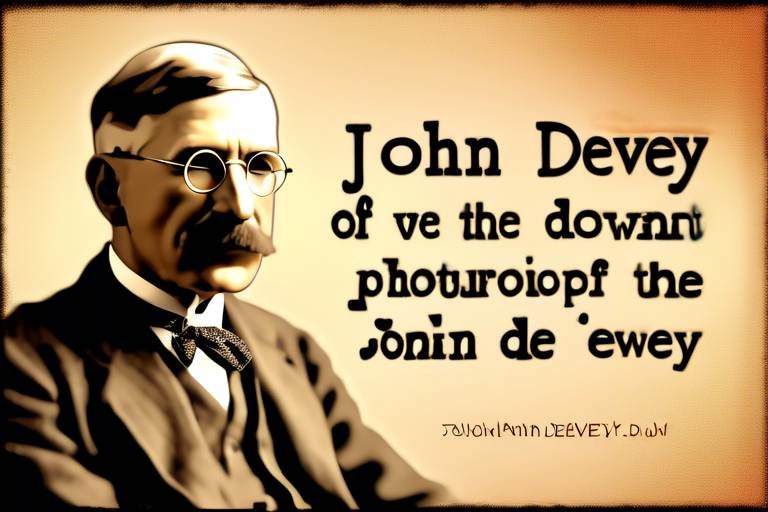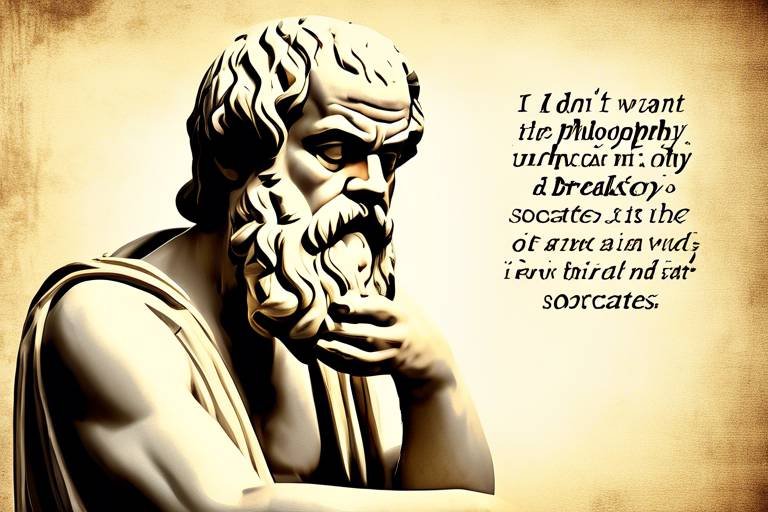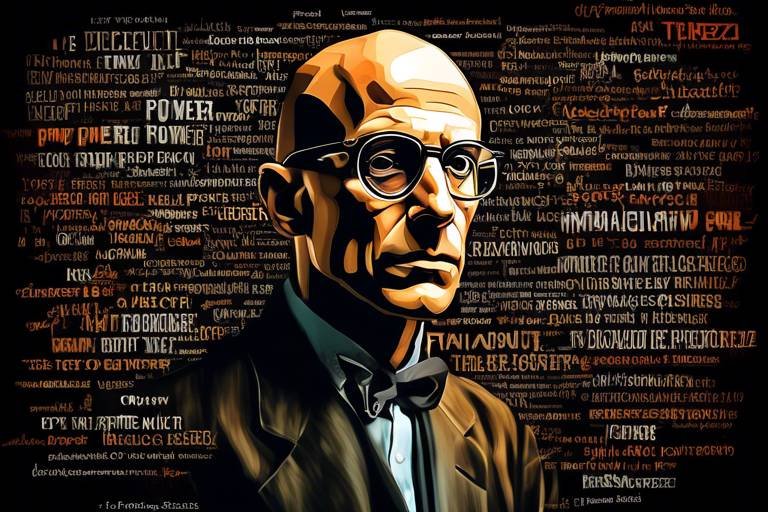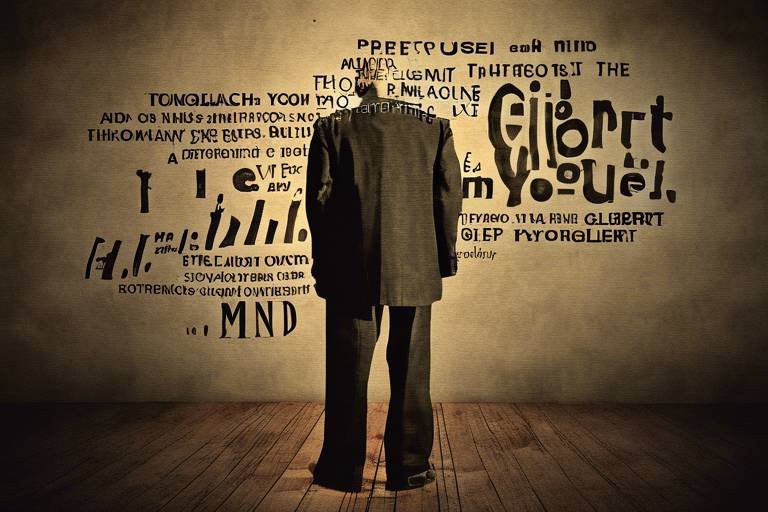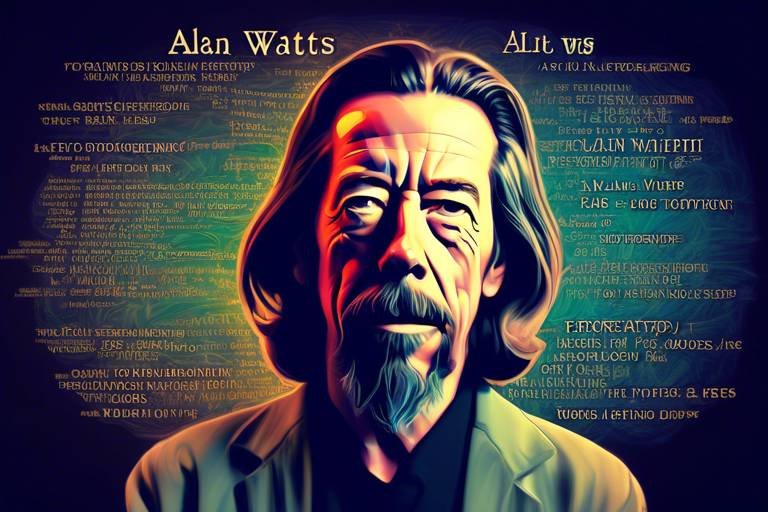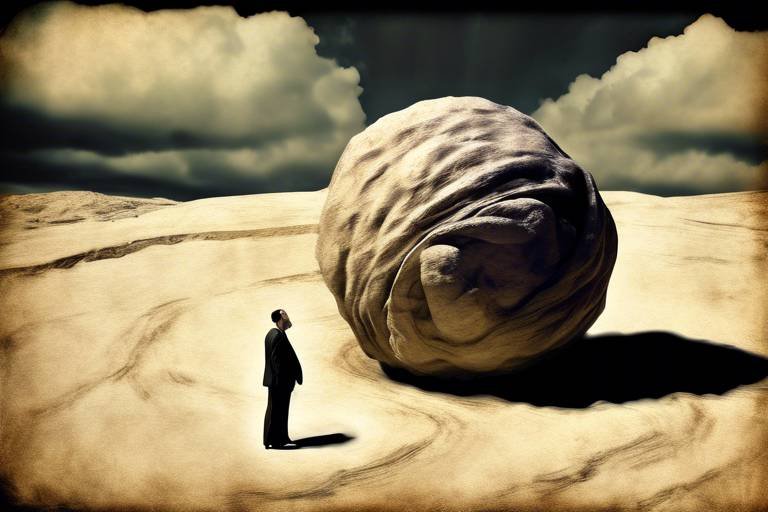Key Concepts in Philosophy - Identity, Duality, Existence
Philosophy is a vast and intricate field that invites us to ponder some of the most profound questions of our existence. At its core, three fundamental concepts stand out: identity, duality, and existence. These ideas are not just abstract theories; they shape our understanding of ourselves and the world around us. Imagine standing in front of a mirror, trying to decipher who you really are. Is it just the reflection you see, or is there something deeper? This is where the exploration of identity begins, leading us to question the very nature of our being.
When we talk about identity, we delve into the essence of what makes us unique individuals. Are we defined by our memories, our choices, or perhaps our relationships? Philosophers have long debated various theories of personal identity, from the psychological continuity theory, which suggests that our identity is tied to our memories and consciousness, to the biological perspective, which posits that our physical body defines who we are. Each theory offers a different lens through which to view ourselves, prompting us to ask: "What truly makes me, me?"
As we navigate through these philosophical waters, we encounter the concept of duality. This idea suggests that there are often two contrasting principles at play in our lives. Take, for instance, the classic mind-body dualism. This perspective, championed by philosophers like René Descartes, proposes that our mind and body are separate entities. It raises intriguing questions: If our thoughts and feelings exist independently of our physical form, how do they interact? This inquiry into the relationship between mind and body has led to numerous debates and theories, each attempting to bridge the gap between the tangible and the intangible.
Descartes famously asserted, "I think, therefore I am," which encapsulates his belief in the primacy of the mind. This statement ignited a philosophical revolution, encouraging others to explore the implications of separating the mind from the body. However, critiques of dualism challenge its viability. How can something non-physical influence something physical? This line of questioning leads us to consider alternative theories, such as physicalism, which argues that everything about the mind can be explained in terms of physical processes. The tension between these viewpoints illustrates the complexity of understanding our existence.
Moreover, duality extends beyond the mind-body debate into the realm of morality. Moral dualism grapples with the ongoing conflict between good and evil. This ethical framework shapes our moral decision-making and influences societal norms. Think about it: every day, we make choices that reflect our values, often navigating the gray areas between right and wrong. The struggle between these opposing forces not only defines our actions but also our identities as moral beings.
Finally, we arrive at the concept of existence. What does it mean to exist? This fundamental inquiry has perplexed thinkers for centuries. Existentialism, for instance, emphasizes individual existence and personal freedom, urging us to take responsibility for our choices. Key existentialist figures like Jean-Paul Sartre and Simone de Beauvoir challenged us to confront the absurdity of life and find meaning through our experiences. Their insights compel us to ask: "What is my purpose in this vast universe?"
In addition, ontology—the study of being—further enriches this discourse. Different ontological theories explore what it means to exist and the nature of reality itself. For instance, some argue that existence is a fundamental property of objects, while others suggest that existence is contingent upon perception. These discussions invite us to reflect on our place in the cosmos and the nature of reality itself.
As we wrap up this exploration of identity, duality, and existence, it’s clear that these concepts are not merely academic; they resonate deeply with our everyday lives. They challenge us to reflect on who we are, how we relate to others, and what it means to truly exist. Philosophy, in this sense, becomes a tool for self-discovery, guiding us through the complexities of life.
- What is identity in philosophy?
Identity in philosophy refers to the qualities, beliefs, personality, looks, and expressions that make a person or group. It encompasses various theories that seek to define what it means to be oneself. - What does duality mean?
Duality refers to the existence of two contrasting principles or concepts, such as mind and body, good and evil, which often interact and influence each other. - What is the significance of existence in philosophy?
The concept of existence is fundamental in philosophy as it explores what it means to be, the nature of reality, and our place within it.

Understanding Identity
Identity is one of those profound concepts that makes you stop and ponder, “Who am I really?” It's not just a question for philosophers; it's something we all grapple with at different points in our lives. At its core, identity is about the essence of being oneself, yet it encompasses so much more. It’s a complex tapestry woven from our experiences, beliefs, and the roles we play in society. Identity can be fluid, often shaped by cultural influences, personal choices, and social interactions. So, how do we define what makes us, *us*?
Philosophers have long debated the nature of personal identity, leading to several intriguing theories. For instance, the psychological continuity theory posits that our identity is tied to our memories and consciousness. In contrast, the biological continuity theory suggests that it’s our physical body that defines our identity. Each theory presents its own implications for how we understand ourselves and our place in the world.
Consider the implications of these theories: if our identity is rooted in memory, what happens when we forget? Or if it’s tied to our physical form, how do we reconcile changes due to aging or injury? These questions highlight the *dynamic nature of identity*. It's not static; it evolves as we navigate through different life stages, relationships, and societal changes.
Moreover, identity is often multifaceted. We wear many hats—friend, sibling, employee, citizen—each contributing to our overall sense of self. This multiplicity can lead to conflicts, especially when different aspects of our identity clash. For instance, a person might feel torn between their cultural heritage and the dominant culture they live in. This internal struggle can lead to a rich exploration of self but can also be a source of confusion and distress.
In the age of social media, identity has taken on new dimensions. Online personas often differ from our real-life selves, prompting questions about authenticity and representation. Are we presenting our true selves, or are we curating an identity that we believe will be accepted? This digital duality adds another layer to our understanding of identity, making it an ever-evolving subject of inquiry.
As we explore the concept of identity, it’s essential to recognize that it’s not just a philosophical exercise; it has real-world implications. Our identity shapes how we interact with others, how we perceive ourselves, and how we navigate the complexities of life. It influences our choices, our relationships, and even our happiness. Thus, understanding identity is not merely an academic pursuit; it’s a journey toward self-discovery and personal growth.
In summary, the exploration of identity is a rich and multifaceted endeavor. It invites us to reflect on our past, understand our present, and contemplate our future. Whether through philosophical inquiry or personal reflection, the quest for identity is a fundamental aspect of the human experience.
- What is personal identity? Personal identity refers to the unique characteristics and experiences that define an individual.
- How does culture influence identity? Culture shapes our beliefs, values, and behaviors, significantly impacting our sense of self.
- Can identity change over time? Yes, identity is dynamic and can evolve due to life experiences, social interactions, and personal growth.
- What role does memory play in identity? Memory is crucial for psychological continuity, connecting our past experiences to our present self.

The Nature of Duality
Duality is a fascinating concept that permeates many aspects of philosophy, culture, and everyday life. At its core, duality refers to the existence of two contrasting principles that often seem to oppose each other yet coexist within a single framework. Think about light and dark, good and evil, or even the mind and body. These contrasting elements not only define our experiences but also shape our understanding of reality. The exploration of duality invites us to ponder profound questions: Can one exist without the other? How do these dualities influence our perceptions and decisions?
In philosophy, duality often manifests in various discussions, particularly in the realms of metaphysics and ethics. For instance, the mind-body problem is a classic example of duality, where the relationship between mental states and physical states is examined. This raises intriguing questions about consciousness, identity, and existence itself. Are our thoughts merely products of our physical brains, or is there something more ethereal at play? These inquiries not only challenge our understanding but also compel us to delve deeper into the nature of reality.
Moreover, the implications of duality extend beyond philosophical discourse; they seep into our daily lives and ethical frameworks. Consider the moral dilemmas we face regularly. The struggle between right and wrong, or the balance between self-interest and altruism, exemplifies moral dualism. When making decisions, we often weigh our options against these opposing forces, leading us to consider the broader impact of our choices.
One of the most prominent discussions surrounding duality is mind-body dualism, which posits that the mind and body are distinct entities. This idea, championed by philosophers like René Descartes, suggests that while our physical body occupies space and can be measured, our mind—our thoughts, feelings, and consciousness—exists in a different realm. This separation raises questions about how the two interact. For instance, if the mind is non-physical, how does it influence our physical actions? This conundrum has led to a rich tapestry of philosophical inquiry, with various perspectives attempting to bridge this gap.
René Descartes significantly influenced the discourse on dualism with his famous assertion, "I think, therefore I am." This statement encapsulates the essence of his philosophy: the act of thinking is proof of one's existence. Descartes argued that the mind is a non-material substance that cannot be reduced to physical properties. His work laid the groundwork for future philosophical exploration into the nature of consciousness and identity, prompting thinkers to grapple with the implications of separating the mind from the body. Descartes' dualism opened the door for discussions about the nature of reality, existence, and what it truly means to be human.
Despite its historical significance, dualism has faced substantial critiques. Many philosophers argue that the mind-body distinction is problematic, raising questions about how two separate entities can interact. If the mind is non-physical, how can it cause physical changes in the body? This skepticism has led to alternative theories, such as physicalism, which posits that everything about the mind can be explained in terms of physical processes. Critics also point out that dualism may lead to a fragmented understanding of human experience, as it separates aspects of our existence that are inherently interconnected.
Another dimension of duality is moral dualism, which explores the conflict between good and evil. This philosophical perspective is not just an abstract concept; it profoundly impacts our ethical frameworks and decision-making processes. In a world rife with moral ambiguity, understanding the duality of good and evil can help us navigate complex situations. For instance, when faced with a moral dilemma, we often find ourselves torn between competing values, such as justice and compassion. This internal struggle illustrates the pervasive nature of duality in our lives, compelling us to reflect on our beliefs and the consequences of our choices.
In conclusion, the nature of duality is a rich and multifaceted topic that invites us to explore the complexities of existence. Whether considering the mind-body relationship or grappling with moral choices, duality challenges us to think critically about our understanding of self and reality. It reminds us that life is rarely black and white, and that embracing the nuances of duality can lead to a deeper comprehension of the world around us.
- What is duality in philosophy? Duality in philosophy refers to the existence of two contrasting principles that often coexist, such as mind and body or good and evil.
- Who is associated with mind-body dualism? René Descartes is a key figure associated with mind-body dualism, famously stating, "I think, therefore I am."
- What are the critiques of dualism? Critics argue that dualism creates challenges in explaining how the mind and body interact and may lead to a fragmented understanding of human experience.
- How does moral dualism affect decision-making? Moral dualism influences our ethical frameworks by highlighting the conflict between good and evil, helping us navigate complex moral dilemmas.

Mind-Body Dualism
Mind-body dualism is a fascinating philosophical concept that suggests a separation between the mind and the body. Imagine your mind as a conductor of an orchestra, directing all the instruments (your body) to create a beautiful symphony. But what if the conductor and the orchestra could exist independently? This is the essence of dualism, a theory that has sparked debates for centuries. At its core, dualism posits that the mind, with all its thoughts, emotions, and consciousness, is distinct from the physical body. This idea raises profound questions about the nature of human existence and the relationship between our mental and physical states.
Historically, dualism can be traced back to ancient thinkers, but it was René Descartes who famously articulated this view in the 17th century. He argued that while our bodies are made of matter and governed by physical laws, our minds are non-material and possess a different kind of existence. Descartes famously declared, "Cogito, ergo sum" (I think, therefore I am), emphasizing that the very act of thinking is proof of one’s existence as a conscious being. This assertion laid the groundwork for modern discussions on consciousness and identity, making Descartes a pivotal figure in the philosophy of mind.
However, the idea of dualism is not without its critics. Many philosophers argue that if the mind and body are indeed separate, how do they interact? This question leads to complex discussions about causality and the nature of consciousness. Some propose alternatives, such as physicalism, which asserts that everything about the mind can be explained by physical processes in the brain. Others advocate for monism, the idea that mind and body are two aspects of the same reality. These alternative theories challenge the dualistic view and encourage deeper exploration into the nature of existence.
To further illustrate the implications of mind-body dualism, consider the following table that outlines some key arguments for and against this perspective:
| Arguments For Dualism | Arguments Against Dualism |
|---|---|
| Intuitive experience of consciousness | Challenges of interaction between mind and body |
| Existence of subjective experiences | Advancements in neuroscience explaining mental states |
| Philosophical support from figures like Descartes | Monistic theories providing cohesive explanations |
As we delve deeper into the implications of mind-body dualism, it becomes clear that this theory not only influences philosophical discourse but also impacts various fields such as psychology, cognitive science, and even medicine. The way we understand our minds and bodies can shape our approaches to mental health, personal identity, and even the nature of reality itself. So, the next time you ponder your thoughts or feel a physical sensation, consider the intricate dance between your mind and body, and the profound questions that arise from their relationship.
- What is mind-body dualism? Mind-body dualism is the philosophical concept that the mind and body are distinct entities that interact with each other.
- Who is a key figure in mind-body dualism? René Descartes is a significant figure known for his contributions to dualistic thought, particularly his statement, "I think, therefore I am."
- What are some criticisms of dualism? Critics argue about the viability of the interaction between mind and body and propose alternative theories such as physicalism and monism.
- How does dualism impact modern philosophy? Dualism influences discussions in various fields including psychology, cognitive science, and ethics, shaping our understanding of consciousness and identity.

Descartes' Contribution
René Descartes, often hailed as the father of modern philosophy, made significant strides in the exploration of dualism with his profound assertion, "Cogito, ergo sum" (I think, therefore I am). This statement encapsulates the essence of his philosophical inquiry into the nature of existence and identity. Descartes posited that the act of thinking is the undeniable proof of one's existence. In a world filled with uncertainty, where perceptions can be deceptive, he found solace in the certainty of thought. This idea laid the groundwork for dualism by establishing a clear distinction between the mind, which is capable of doubt and reflection, and the body, which is subject to the physical laws of nature.
Descartes argued that the mind and body are fundamentally different substances. The mind, or soul, is non-material and operates independently of the physical world, while the body is material and interacts with the physical environment. This separation raises intriguing questions about the nature of consciousness and self-awareness. How can a non-physical mind influence a physical body? This question has sparked debates that continue to resonate in contemporary philosophical discussions.
To illustrate his dualistic view, Descartes employed a method of radical doubt, systematically questioning all beliefs that could be doubted. He concluded that while he could doubt the existence of the physical world, he could not doubt the existence of his own thoughts. This led him to propose a two-substance theory, which can be summarized as follows:
| Substance | Characteristics |
|---|---|
| Mind | Non-material, thinking substance, capable of doubt and reflection |
| Body | Material substance, subject to physical laws, does not think |
This dualistic framework has had profound implications for various fields, including psychology, neuroscience, and ethics. It opened the door to discussions about the nature of consciousness and the relationship between mental states and physical actions. However, Descartes' theories were not without criticism. Many philosophers have challenged the viability of his dualism, questioning how two distinct substances could interact. This critique has led to alternative theories, such as physicalism, which posits that everything about the mind can be explained in terms of physical processes.
Despite the critiques, Descartes' contributions to philosophy cannot be overstated. His emphasis on rationalism and the importance of self-awareness has influenced countless thinkers and remains a cornerstone in the study of identity and existence. His work invites us to ponder the complexities of our own minds and bodies, urging us to explore the intricate tapestry of human experience.
- What is the main idea of Descartes' dualism? Descartes' dualism posits that the mind and body are distinct entities that interact with each other, emphasizing the non-material nature of the mind.
- How did Descartes prove his existence? He famously stated, "I think, therefore I am," suggesting that the act of thinking is the undeniable proof of one's existence.
- What are some criticisms of Descartes' dualism? Critics argue about the interaction between mind and body and propose alternative theories like physicalism, which explains mental states in terms of physical processes.

I think, therefore I am.
This article explores fundamental philosophical ideas, focusing on identity, duality, and existence, and how these concepts shape human understanding of self and reality.
Identity is a core philosophical concept that examines what it means to be oneself. This section delves into various theories of personal identity and their implications for self-understanding.
Duality refers to the existence of two contrasting principles. This section explores the concept of duality in philosophy, including its manifestations in mind-body discussions and moral dichotomies.
Mind-body dualism posits that the mind and body are distinct entities. This discussion addresses the historical context and key arguments for and against this perspective.
René Descartes significantly influenced dualism with his famous assertion, This statement encapsulates the essence of self-awareness and existence. Descartes argued that the very act of thinking is proof of one’s existence; if you are capable of doubt, reflection, or reasoning, then you must exist in some form. This idea not only challenges us to consider our own consciousness but also sets the stage for modern philosophy. It raises profound questions: What does it mean to exist? How does our thought process shape our understanding of reality? Descartes' perspective invites us to explore the depths of our consciousness and the nature of our being.
Critiques of dualism challenge its viability, raising questions about the interaction between mind and body. This section discusses prominent counterarguments and alternative theories.
Moral dualism explores the conflict between good and evil. This section analyzes how this duality shapes ethical frameworks and influences moral decision-making.
Existence is a fundamental philosophical inquiry that examines what it means to exist. This section investigates various existential theories and their implications for understanding life and reality.
Existentialism emphasizes individual existence and personal freedom. This subsection explores key existentialist thinkers and their contributions to the understanding of existence and meaning.
Ontology is the study of being and existence. This section discusses different ontological theories and their significance in philosophical discourse.
- What does "I think, therefore I am" mean?
This phrase suggests that the act of thinking is proof of one's existence. If you can think, you must exist in some form. - Who is René Descartes?
Descartes was a French philosopher and mathematician, widely regarded as the father of modern philosophy. - What is dualism?
Dualism is the idea that two fundamental principles exist, often referring to the mind and body as separate entities. - How does existentialism differ from traditional philosophy?
Existentialism focuses on individual freedom and the subjective experience of existence, rather than objective truths.

This subsection examines Descartes' arguments and their impact on subsequent philosophical thought.
This article explores fundamental philosophical ideas, focusing on identity, duality, and existence, and how these concepts shape human understanding of self and reality.
Identity is a core philosophical concept that examines what it means to be oneself. This section delves into various theories of personal identity and their implications for self-understanding.
Duality refers to the existence of two contrasting principles. This section explores the concept of duality in philosophy, including its manifestations in mind-body discussions and moral dichotomies.
Mind-body dualism posits that the mind and body are distinct entities. This discussion addresses the historical context and key arguments for and against this perspective.
René Descartes significantly influenced dualism with his famous assertion, "I think, therefore I am." This powerful statement encapsulates the essence of human existence through the lens of thought. Descartes argued that the act of thinking is undeniable proof of one's existence. He proposed that while the body is a physical entity subject to the laws of nature, the mind operates in a realm of its own, characterized by consciousness and rationality.
This distinction between mind and body laid the groundwork for countless philosophical debates. Descartes' dualism suggested that the mind could exist independently of the body, leading to profound implications for our understanding of personal identity and existence. For example, if the mind can exist separately, what does that mean for the concept of self? Are we merely our physical forms, or is there a deeper essence that defines us?
The impact of Descartes' arguments extends beyond his time, influencing a myriad of thinkers and schools of thought. His ideas prompted further exploration into the relationship between consciousness and the physical world. Philosophers like Spinoza and Leibniz responded with their own theories, proposing alternative views on the interplay between mind and body.
In contemporary discussions, Descartes' dualism remains a pivotal reference point. Many modern philosophers grapple with the implications of his assertions, questioning whether the mind truly exists apart from the body or if they are inextricably linked. This ongoing discourse highlights the enduring relevance of Descartes' contributions to philosophy.
Critiques of dualism challenge its viability, raising questions about the interaction between mind and body. This section discusses prominent counterarguments and alternative theories.
Moral dualism explores the conflict between good and evil. This section analyzes how this duality shapes ethical frameworks and influences moral decision-making.
Existence is a fundamental philosophical inquiry that examines what it means to exist. This section investigates various existential theories and their implications for understanding life and reality.
Existentialism emphasizes individual existence and personal freedom. This subsection explores key existentialist thinkers and their contributions to the understanding of existence and meaning.
Ontology is the study of being and existence. This section discusses different ontological theories and their significance in philosophical discourse.
- What is the main idea behind Descartes' dualism? Descartes' dualism posits that the mind and body are separate entities, with the mind representing consciousness and the body representing physical existence.
- How did Descartes influence modern philosophy? Descartes laid the groundwork for discussions on personal identity and the nature of existence, prompting later philosophers to explore the relationship between mind and body.
- What are some critiques of dualism? Critics argue that dualism fails to explain how the mind and body interact, leading to alternative theories that propose a more integrated view of existence.

Critiques of Dualism
Critiques of dualism present a compelling challenge to the idea that mind and body are separate entities. One of the primary arguments against dualism is the interaction problem. If the mind and body are indeed distinct, how do they interact? This question has perplexed philosophers for centuries. For instance, if you stub your toe and feel pain, how does this physical sensation relate to the non-physical mind? Critics argue that dualism fails to provide a satisfactory explanation for this interaction, leading some to suggest that a more integrated view of mind and body is necessary.
Another significant critique comes from the realm of neuroscience. Advances in brain science have shown that many mental processes correlate closely with physical brain activity. This correlation challenges the dualist perspective by suggesting that mental states are not separate from physical states but rather are deeply intertwined. For example, studies have demonstrated that changes in brain chemistry can lead to alterations in mood and thought processes, implying that our mental experiences are rooted in our biological makeup.
Additionally, the rise of physicalism has provided a robust alternative to dualism. Physicalism posits that everything about the mind can be explained in terms of physical processes. This view aligns with the scientific understanding of the universe, where everything can ultimately be reduced to physical matter and energy. Proponents of physicalism argue that dualism is an outdated notion that does not hold up against contemporary scientific findings.
Moreover, critics often point to the problem of overlapping properties. If the mind and body are two distinct substances, then they must have different properties. However, many mental states seem to exhibit properties that are not easily categorized as either physical or mental. For instance, emotions can be influenced by both mental states (like thoughts) and physical states (like hormonal changes), creating a complex interplay that dualism struggles to explain.
In summary, while dualism has played a significant role in philosophical discourse, its critiques highlight fundamental challenges that question its validity. The interaction problem, advancements in neuroscience, the rise of physicalism, and the overlapping properties of mental and physical states all contribute to a growing skepticism towards dualist perspectives. As we continue to explore the nature of consciousness and existence, it becomes increasingly clear that the relationship between mind and body may be far more intricate than dualism suggests.
- What is dualism? Dualism is the philosophical view that the mind and body are fundamentally distinct entities, each with its own properties.
- Who is René Descartes? René Descartes was a French philosopher known for his contributions to dualism, famously stating, "I think, therefore I am."
- What is physicalism? Physicalism is the view that everything about the mind can be explained in terms of physical processes and properties.
- Why is the interaction problem significant? The interaction problem raises critical questions about how two distinct substances (mind and body) can influence each other, challenging the coherence of dualism.

Moral Dualism
Moral dualism is a fascinating philosophical concept that delves into the eternal struggle between good and evil. It’s like a cosmic tug-of-war where each side pulls at the very fabric of our ethical beliefs. Imagine standing at a crossroads, with one path leading to virtue and the other to vice. This duality isn’t just a theoretical exercise; it profoundly shapes our moral frameworks and influences the choices we make every day.
At its core, moral dualism suggests that there are two opposing forces that govern human behavior and ethical decision-making. This perspective posits that our lives are not just a series of choices, but rather a battleground where good and evil continuously clash. The implications of this duality can be seen in various aspects of life, from personal relationships to societal norms. For instance, consider how narratives in literature and film often depict heroes and villains, reinforcing the idea that our world is divided into good and evil.
One of the most compelling aspects of moral dualism is how it challenges us to grapple with our own ethical beliefs. It forces us to ask tough questions: What does it mean to be good? Is it possible to be completely virtuous, or do we all harbor some darkness within us? These inquiries are not just philosophical musings; they have real-world consequences. The moral dilemmas we face often reflect this duality, as we weigh our options against the backdrop of right and wrong.
Furthermore, moral dualism can be observed in various philosophical traditions. For example, in many religious contexts, the struggle between good and evil is a central theme. In Christianity, the battle between God and Satan serves as a powerful metaphor for moral choices. Similarly, in Eastern philosophies, the yin-yang symbol illustrates how opposing forces are interconnected and interdependent. This duality prompts us to reflect on the nature of our own existence and the choices we make.
To better understand moral dualism, let’s look at some key characteristics:
- Conflict of Values: Moral dualism highlights the tension between opposing ethical principles, such as honesty versus deceit.
- Influence on Decision-Making: The awareness of this duality can significantly impact how individuals approach moral dilemmas.
- Reflection of Human Nature: It suggests that humans are inherently capable of both good and evil, emphasizing the complexity of our moral landscape.
In conclusion, moral dualism invites us to consider the complexities of our ethical beliefs and the choices we face. It’s a reminder that life is not merely black and white; instead, it’s a rich tapestry woven with shades of gray. By acknowledging this duality, we can better understand ourselves and the world around us, leading to more informed and compassionate decision-making.
What is moral dualism?
Moral dualism is the philosophical concept that posits the existence of two opposing moral forces—good and evil—that influence human behavior and ethical decision-making.
How does moral dualism affect our daily choices?
Moral dualism encourages individuals to reflect on their values and the consequences of their actions, often leading to more thoughtful and informed decisions.
Can moral dualism be found in literature and media?
Yes, moral dualism is a prevalent theme in literature and media, often depicted through the conflict between heroes and villains, which illustrates the struggle between good and evil.

The Concept of Existence
When we dive into the concept of existence, we are embarking on a journey that questions the very fabric of reality itself. What does it mean to exist? Is existence merely a physical presence, or does it encompass something deeper? These questions have puzzled thinkers for centuries and continue to ignite passionate debates among philosophers, scientists, and everyday individuals alike. At its core, the inquiry into existence is not just about being; it's about understanding the essence of being.
Existence can be examined through various lenses, each offering unique insights. From the existentialists who emphasize individual experience and freedom to ontologists who study the nature of being, the exploration of existence is rich and diverse. For instance, existentialism, a philosophical movement that gained traction in the 20th century, posits that existence precedes essence. This means that individuals are not born with a predetermined purpose; rather, they create their own meaning through choices and actions. This idea is both liberating and daunting, as it places the responsibility of defining one's life squarely on the individual.
On the other hand, ontology—the branch of metaphysics dealing with the nature of being—takes a more structured approach. It categorizes existence into various entities and explores their relationships. To illustrate this, consider the following table that outlines key ontological categories:
| Category | Description |
|---|---|
| Physical Entities | Objects that have a tangible presence in the universe, such as trees, rocks, and humans. |
| Abstract Entities | Concepts that do not have a physical form, like numbers, ideas, and emotions. |
| Possible Entities | Things that could exist but do not currently, such as fictional characters or hypothetical scenarios. |
As we navigate through these categories, we begin to see how our understanding of existence shapes our perception of reality. For instance, when we acknowledge the existence of abstract entities, we open ourselves up to a world of ideas that influence our thoughts and actions. This interplay between the physical and the abstract is a central theme in philosophical discussions about existence.
Moreover, the concept of existence is not limited to philosophical musings; it permeates our everyday lives. Consider the fundamental human experience of questioning our purpose. Have you ever found yourself pondering, "Why am I here?" This inquiry is a reflection of our innate desire to find meaning in our existence. It drives us to explore, to learn, and to connect with others. In this sense, the concept of existence serves as a catalyst for personal growth and understanding.
In conclusion, the concept of existence is a multifaceted idea that invites us to explore not only the nature of being but also our place within the universe. Whether through the lens of existentialism, ontology, or personal introspection, the quest to understand existence is a journey that ultimately leads us to a greater appreciation of life itself. So, the next time you find yourself lost in thought about your existence, remember that you are part of a long-standing philosophical tradition that seeks to unravel the mysteries of life.
- What is the main question philosophers ask about existence?
Philosophers primarily ask, "What does it mean to exist?" This question encompasses various aspects of reality, self, and the universe. - How does existentialism differ from other philosophical theories?
Existentialism focuses on individual experience and the idea that existence precedes essence, while other theories may emphasize predetermined purposes or universal truths. - What role does ontology play in understanding existence?
Ontology studies the nature of being and categorizes different forms of existence, helping us understand the relationships between various entities.

Existentialism
Existentialism is a philosophical movement that dives deep into the essence of human existence, emphasizing the importance of individual freedom and choice. Picture yourself standing at a crossroads, with countless paths before you; existentialism is all about the choices you make and how those choices define who you are. It challenges the traditional notions of predetermined destiny and instead posits that we are the architects of our own lives. Think of it as a blank canvas where you are free to paint your own picture, filled with colors of your experiences, emotions, and decisions.
This philosophical approach gained traction in the 20th century, with prominent figures like Jean-Paul Sartre and Simone de Beauvoir leading the charge. Sartre famously declared, "Existence precedes essence." What he meant by this is that we first exist, and through our actions, we create our essence. In other words, we are not born with a specific purpose; instead, we carve out our identity through the choices we make. This idea can be both liberating and terrifying. It places the responsibility of meaning squarely on our shoulders, compelling us to confront the anxiety that comes with absolute freedom.
Existentialism also grapples with the concept of absurdity—the conflict between our desire for meaning and the indifferent universe that often seems devoid of it. Albert Camus, another key thinker in this realm, explored this theme extensively. In his work, he suggested that life is inherently absurd, yet we must find our own meaning within that absurdity. Imagine trying to solve a puzzle with missing pieces; existentialism teaches us to embrace the chaos and find joy in the journey, even if the end result is incomplete.
Moreover, existentialism encourages self-reflection and authenticity. It urges individuals to look inward and ask themselves tough questions: Who am I? What do I truly want? Am I living authentically, or am I merely conforming to societal expectations? This introspection can lead to a deeper understanding of oneself and foster a sense of purpose. In a world filled with distractions and noise, existentialism acts as a reminder to pause, reflect, and connect with our true selves.
To sum it up, existentialism is not just a dry philosophical theory; it’s a vibrant exploration of what it means to be human. It invites us to embrace our freedom, confront the absurd, and engage in the quest for meaning. So, the next time you find yourself at a crossroads, remember that the power to choose lies within you, and it’s your choices that will ultimately define your existence.
- What is the main idea of existentialism? Existentialism focuses on individual freedom, choice, and the search for meaning in an indifferent universe.
- Who are the key figures in existentialism? Prominent existentialist thinkers include Jean-Paul Sartre, Simone de Beauvoir, and Albert Camus.
- How does existentialism view the concept of meaning? Existentialism suggests that meaning is not given but created through individual choices and experiences.
- What is the relationship between existentialism and absurdity? Existentialism acknowledges the absurdity of life and encourages individuals to find meaning despite it.

Ontology and Being
Ontology, at its core, is the philosophical study of being and existence. It prompts us to ask profound questions such as, "What does it mean to exist?" and "What is the nature of reality?" These questions may seem abstract, but they are central to understanding our place in the universe. Imagine ontology as a vast landscape where various theories and ideas about existence unfold like a map, guiding us through the complexities of life.
One of the fundamental aspects of ontology is the distinction between existence and essence. To illustrate, consider a tree. Its existence is the physical presence we can see, touch, and interact with, while its essence encompasses the qualities that make it a tree—its structure, its leaves, and its role in the ecosystem. Thus, ontology challenges us to reflect on the relationship between what something is and what it means to be that thing.
Throughout history, various philosophers have contributed to ontological discussions, each adding layers of depth to our understanding. For instance, Aristotle viewed being as a fundamental category, suggesting that everything that exists can be classified into different categories of being. In contrast, Heidegger emphasized the importance of "Being" itself, arguing that understanding existence requires us to contemplate our own being in the world.
Moreover, ontological theories can be grouped into different categories, each offering unique perspectives:
- Realism: This view posits that entities exist independently of our perception. For realists, the world is filled with objects that are real, regardless of whether we observe them.
- Idealism: In contrast, idealists argue that reality is mentally constructed. According to this perspective, the mind plays a crucial role in shaping our understanding of existence.
- Materialism: This theory asserts that only physical matter exists. Materialists focus on the tangible aspects of reality, often dismissing non-physical entities as mere illusions.
As we navigate these ontological theories, we find ourselves confronted with the implications of our existence. What does it mean to be a conscious being in a universe that may be indifferent to our presence? This question leads to a deeper exploration of the human condition, as we grapple with our mortality, our desires, and our relationships with others.
In contemporary discussions, ontology intersects with various fields, including science and technology. For instance, the rise of artificial intelligence raises ontological questions about the nature of consciousness and whether machines can possess a form of being comparable to humans. As we advance into an era dominated by technology, these questions become increasingly relevant, challenging our traditional notions of what it means to exist.
In summary, ontology is not just an abstract philosophical discipline; it is a vital framework that shapes our understanding of existence and being. By engaging with ontological questions, we embark on a journey of self-discovery and exploration, ultimately seeking to comprehend the intricate tapestry of reality that surrounds us.
- What is ontology?
Ontology is the branch of philosophy that studies the nature of being, existence, and reality.
- How does ontology differ from metaphysics?
While ontology is a subset of metaphysics focused specifically on being and existence, metaphysics encompasses a broader range of topics, including the nature of reality, time, and space.
- Why is ontology important?
Ontology helps us understand the fundamental nature of reality, guiding our perceptions and interpretations of existence, which is crucial for philosophy, science, and everyday life.
Frequently Asked Questions
- What is the philosophical concept of identity?
Identity in philosophy refers to the understanding of what it means to be oneself. It explores how individuals perceive themselves and the factors that contribute to their personal identity. This includes discussions about memory, consciousness, and the continuity of the self over time.
- How does duality manifest in philosophy?
Duality in philosophy often presents itself as the existence of two contrasting principles, such as mind and body or good and evil. These dualities help us understand complex relationships and conflicts in human experience, shaping our moral and existential frameworks.
- What is mind-body dualism?
Mind-body dualism is the idea that the mind and body are separate entities. This perspective suggests that mental phenomena are non-physical and that our consciousness exists independently of our physical form. It's a significant topic in discussions of personal identity and the nature of existence.
- Who was René Descartes, and what did he contribute to dualism?
René Descartes was a French philosopher known for his influential ideas on dualism, particularly his famous statement, "I think, therefore I am." His work laid the groundwork for modern philosophy by arguing for the distinctness of the mind from the body, sparking debates that continue to this day.
- What are some critiques of dualism?
Critiques of dualism challenge its validity by questioning how the mind and body interact if they are indeed separate. Critics argue that this separation fails to account for the complexities of human experience, leading to alternative theories that seek to unify the mind and body.
- What is moral dualism?
Moral dualism examines the conflict between good and evil, influencing ethical frameworks and moral decision-making. It helps us navigate the complexities of moral choices by presenting clear distinctions between right and wrong, but also raises questions about the nature of morality itself.
- What does existence mean in philosophical terms?
Existence in philosophy is a fundamental inquiry into what it means to exist. It encompasses various existential theories that explore the nature of life, reality, and the human condition, prompting deep reflections on our purpose and the essence of being.
- What is existentialism?
Existentialism is a philosophical movement that emphasizes individual existence, freedom, and choice. It focuses on the unique experiences of individuals and how they create meaning in their lives, often in the face of an indifferent universe.
- What is ontology?
Ontology is the branch of philosophy that studies being and existence. It investigates the nature of reality, categorizing entities and their relationships, and plays a crucial role in philosophical discourse by addressing questions about what it means to exist.

